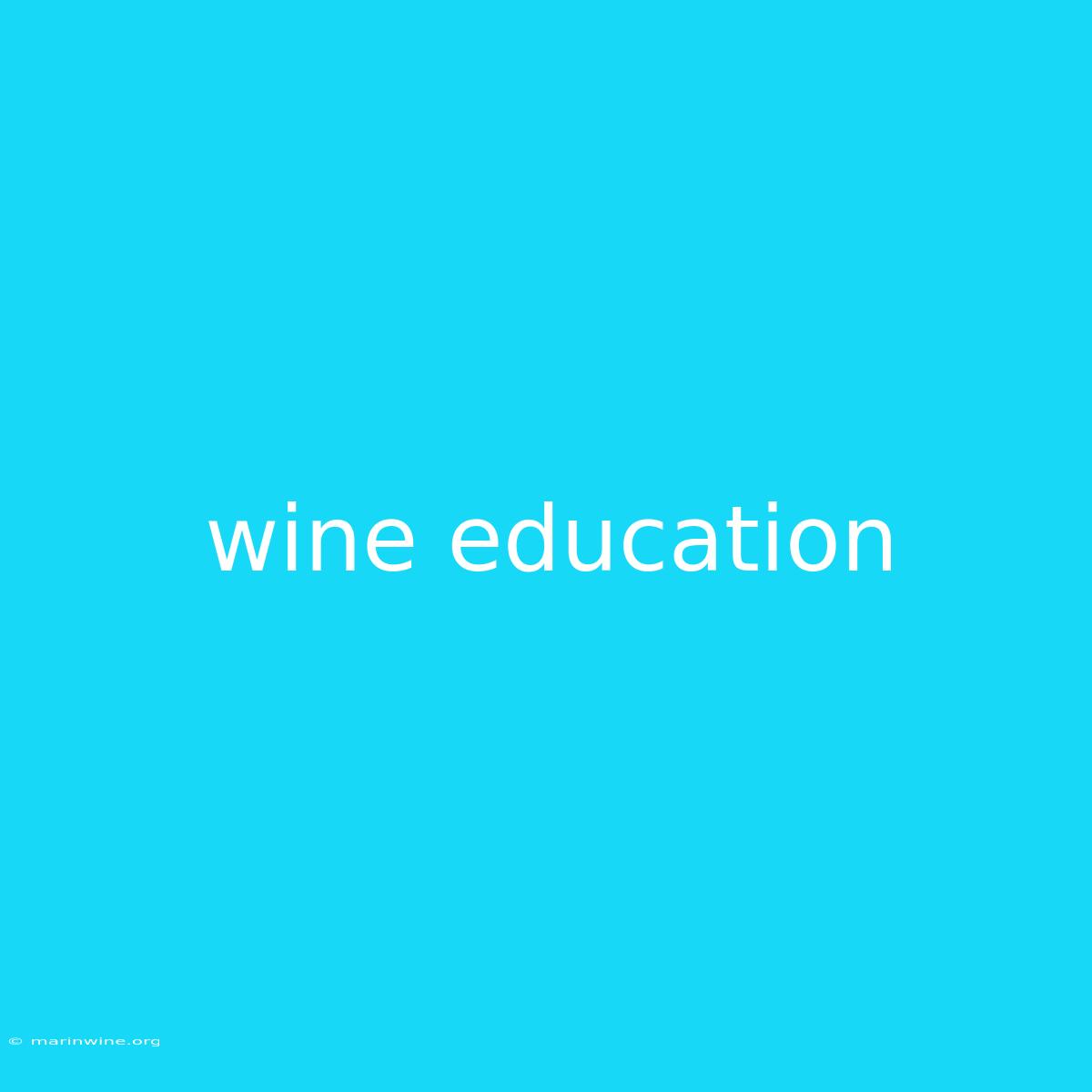Uncorking the Secrets: A Deep Dive into Wine Education
Have you ever looked at a wine list and felt overwhelmed? The sheer number of grapes, regions, and vintages can be intimidating, even for seasoned drinkers. Wine education empowers you to navigate the world of wine with confidence and appreciation.
Why It Matters: Wine education is more than just learning about different types of wine. It's about understanding the intricate relationship between soil, climate, and grape varietals; appreciating the nuances of flavor profiles; and gaining the knowledge to choose wines that perfectly complement your meals and experiences.
Key Takeaways of Wine Education:
| Takeaway | Description |
|---|---|
| Expanding your palate: Developing your ability to identify different flavors and aromas. | |
| Understanding winemaking techniques: Learning about the processes from grape to bottle, including fermentation, aging, and blending. | |
| Exploring wine regions and grape varietals: Discover the diverse world of wine, from classic Bordeaux to emerging South American producers. | |
| Pairing wine with food: Master the art of complementing flavors and enhancing your dining experience. | |
| Building a collection: Gaining the knowledge to select and store wines for personal enjoyment. |
Wine Education: Unveiling the Secrets
Understanding Wine Basics
Wine, in its simplest form, is a fermented beverage created from grapes. The process begins with harvesting ripe grapes, crushing them to release juice, and fermenting the juice with yeast, transforming sugars into alcohol.
Key Aspects:
- Grape Varietals: There are countless grape varietals, each contributing unique flavors, aromas, and characteristics to the wine. Some popular varietals include Cabernet Sauvignon, Chardonnay, Pinot Noir, and Sauvignon Blanc.
- Wine Regions: Terroir, the combination of soil, climate, and geographical location, profoundly influences the quality and characteristics of the grapes. Regions like Burgundy, Tuscany, and Napa Valley are renowned for their distinct terroir and resulting wines.
- Winemaking Techniques: Winemakers employ various techniques to influence the final flavor profile, including oak aging, blending, and temperature control.
Exploring Wine Styles
Wine styles vary widely based on the grape variety, winemaking techniques, and region of origin.
Key Aspects:
- Red Wines: Typically bolder in flavor and color, often with higher tannins, and often aged in oak barrels. Examples include Cabernet Sauvignon, Merlot, and Pinot Noir.
- White Wines: Generally lighter in body and color, with a wider spectrum of flavor profiles from crisp and acidic to creamy and buttery. Popular varietals include Chardonnay, Sauvignon Blanc, and Riesling.
- Rosé Wines: Often made with red grapes and typically exhibit a pale pink color and refreshing fruitiness.
- Sparkling Wines: Characterized by bubbles, with a range of styles from dry and light to sweet and rich. Examples include Champagne, Prosecco, and Cava.
Wine Tasting Techniques
Wine tasting is an art that involves engaging all your senses to fully appreciate the wine's complexities.
Key Aspects:
- Visual Inspection: Observe the wine's color, clarity, and viscosity.
- Aroma: Identify key aromas, such as fruit, spice, floral, or earthy notes.
- Taste: Consider the wine's sweetness, acidity, tannins, body, and finish.
- Pairing: Experiment with pairing wines with different foods to explore flavor combinations.
The Journey of Wine Education
Wine education can be a lifelong pursuit. It begins with the basics and progressively deepens as you explore different wine regions, styles, and techniques.
Key Aspects:
- Wine Courses: Formal courses offered by universities, wine schools, or local wine shops.
- Wine Tasting Events: Guided tastings organized by wineries, wine shops, or wine clubs.
- Wine Books and Websites: A wealth of resources available for self-study.
- Travel: Experiencing wine regions firsthand offers invaluable insights into the production process and local culture.
FAQ: Wine Education
Q: Do I need to be an expert to enjoy wine? A: Absolutely not! Wine education is about enhancing your enjoyment, not becoming a sommelier.
Q: What are the best ways to start learning about wine? A: Begin with a basic wine course or attend a tasting event. Explore wine books and websites for additional information.
Q: How can I improve my wine tasting skills? A: Practice tasting different wines and identify the key characteristics, such as flavor profiles and aromas.
Q: What is the best way to pair wine with food? A: Consider the flavor profiles of the wine and dish and aim for complementary tastes. For example, red wines often pair well with grilled meats, while white wines complement seafood.
Q: How can I learn more about specific wine regions? A: Travel to the region or research online resources about the region's history, climate, and grape varietals.
Q: Is wine education expensive? A: Wine education can be tailored to your budget. There are free online resources, affordable courses, and more expensive experiences, such as wine tours.
Tips for Wine Education
- Start small: Choose a few grape varietals or wine regions to focus on.
- Keep a tasting journal: Record your tasting notes and observations to track your progress.
- Join a wine club: Attend tasting events and learn from other enthusiasts.
- Explore local wineries: Visit local wineries to experience the winemaking process firsthand.
- Don't be afraid to experiment: Try new wines and explore different flavor profiles.
Summary of Wine Education
Wine education unlocks a world of flavor, knowledge, and enjoyment. From understanding basic winemaking techniques to exploring diverse regions and grape varietals, the journey of wine education offers a continuous exploration of the fascinating world of wine. It's about building your palate, appreciating the complexities of flavor, and enhancing your dining experiences.
Enjoy the journey!

